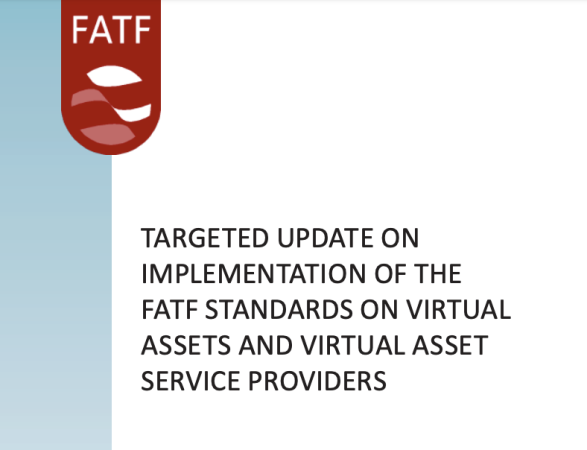The year 2021 started off with much uncertainty after the outgoing FinCEN administration issued a troubling proposal for rulemaking to regulate exchange-to-private wallet transactions. While this was eventually quashed due to a negative industry response, the FATF’s February proposal to update its Virtual Asset and Virtual Asset Service Provider (VASP) guidance caused new initial headaches for the crypto industry as it took aim at DeFi, stablecoins, NFTs and other vital organs of the growing crypto ecosystem.
FATF Update
The FATF’s update was finally promulgated in November 2021, after much deliberation with the private sector, and while it certainly creates the foundation for stronger regulation of stablecoins, DeFi and private wallets in the future, for now it seems that the crypto industry still holds its own fate in its hands, and FATF remaining largely hands-off as it puts the onus on the industry to deal with issues like the Travel Rule’s “sunrise problem” of delayed implementation as well as cross-party due diligence. See further below our table “State of the FATF Travel Rule for 2022.”
US and China
Both China and the US took a hard stance at times with the crypto sector this year, with especially US lawmakers and politicians on both sides of the aisle blasting the virtual assets sector for its perceived lawlessness and environmental harm, but ultimately it was the unexpected PRC ban on crypto mining and trading that might have “softened” the United States’ attitude toward crypto regulation.
With a large chunk of BTC hash power now residing domestically in powerful states like Texas, California and New York and the taxation of digital assets increasingly essential to the success of the country’s lumbering Infrastructure Bill, bipartisan regulators took a much more reconciliatory tone towards the nascent industry in a recent hearing featuring leading crypto executives.
This comes despite a slew of harmful legal maneuvers by the SEC, FinCEN and others this year against the likes of Coinbase, BitMEX, Binance, FTX and even decentralized exchanges like Uniswap, and the new Acting Comptroller of the Currency Michael Hsu blasting DeFi and threatening to roll back Brian Brooks’ reforms mid-year.
It would appear that the US is beginning to create a cohesive strategy to regulate cryptocurrencies, and while this may cause some short term pain without a doubt, in the long run the regulatory clarity will be very positive for the prospects of crypto on a global scale.
Europe and UK
Elsewhere, Europe continues to refine its incoming Markets in Crypto Assets (MiCA) framework to uniformly regulate areas like DeFi across the 27-member countries of the EU, and also formally introduced the Travel Rule in June 2021, proposing its information-sharing requirements to align it with that of the FATF Travel Rule. This was soon followed by the UK’s HM Treasury, who rolled out public consultation and similar Travel Rule measures in July that must be implemented by Spring 2022.
Looking to 2022
As crypto continues to rise, so do the stakes for countries, who now increasingly rely on this new technology sector to fill their tax coffers. Try to regulate crypto out of existence, and you might very well play into the hands of your opponents, like China did with Bitcoin mining, spreading the wealth and hashpower to other grateful nations.
Regulate it too lightly, and you may draw the ire of FATF and other influential AML regulators. The key will be to find the right sustainable balance between sensible, informed regulation and rulemaking that doesn’t stifle the unbridled innovation and reimagination of a fairer, more optimal global financial system for all nations.
Expect an impactful 2022 for VASPs and regulators alike, as they pick this clumsy and nervous first dance between them up a notch to try and strike the right rhythm, now more like equals than ever before.
State of the FATF Travel Rule for 2022
Please note: The information collected below on the various jurisdictions is to the best of our knowledge and we take no responsibility for its accuracy as it may change very quickly.
| Country | Regulation | Travel Rule Deadline | Specific to Country |
| ASIA | |||
| Japan | AML guidelines in Feb 2021, and in March 2021 the FSA made request to Japan SRO to JVCEA regarding the travel rule | JVCEA will implement self-regulatory rules in April 2022 | the regulator is relying on the SRO |
| Singapore | PSN02 in force since January 2020 | Already live since January 2020 but exempted certain entities who had to apply for licensing in the next 6 months until a final decision was made. Decisions are being made currently – many have had to shut down operations. | All transactions require some exchange of information, not just those above threshold and proof of wallet ownership if customers sending to their own non-custodial wallets |
| South Korea | March 2021 with a 6-month grace period to September 2021. | March 25th, 2022 | VASPs need information security certification and real name bank account |
| Malaysia | Jan 2020 revised guidelines, came into force in October 2020 | April 2022 | Aligning very closely to FATF and trying to regulate ICOs |
| Indonesia | August 2020 pulling crypto firms into AML/CFT regulation | April 2022 | Have been preparing for full FATF membership for several years |
| Philippines | crypto AML policy in 2017 expanded in Jan 2021 to align with FATF | LIVE since August 2021 (6.5 months to comply after published in official Gazette) | Regulated VASPs can only engage with other regulated or authorized VASPs |
| Taiwan | Pulled crypto firms into AML regulation since July 2021 | Not specified yet | Reviewing transactions with VASPs outside Taiwan |
| Hong Kong | New licensing regime being considered which would change the current “opt-out” scheme to a compulsory one | Not yet specified under the new regime | Limiting regulated exchange services to professional investors only would transform and shrink the landscape |
Thailand | AML regulation effective since Sept 2021, Digital Asset Emergency Decree since 2018 | Measures being decided by the regulator but no deadline announced | Draft rules for custodians are being reviewed, filed criminal complaint against Binance for lack of licensing, only certain coins allowed |
| EU | AML package proposed in summer 2021 to address what MICA did not. Although the EU legislative process would take years to implement, it is possible that it could be accelerated | Proposal for the travel rule made in June 2021 but now dependent on the EU legislative process. Date of publication in the journal is not announced yet although some individual countries have started to align to FATF but with a grace period and the caveat that any final EU legislation will override national rules | Some countries (Germany, Netherlands, etc) have already issued crypto regulation that will need to be aligned with EU-wide mandates |
Switzerland | Since 2019; the Swiss regulator has since aligned discrepancies such as minimum threshold with FATF guidance | LIVE since January 2020 | Prohibits transfer of funds to most unregulated wallets or must prove beneficial ownership |
| US | In 2019 FinCEN issued guidance restating that Travel Rule compliance applies to crypto firms, 2020 proposal to lower the travel rule threshold | LIVE since 2013 but no enforcement/fines | Current threshold of $3,000 does not align with FATF’s $1,000 and new proposal for $250 would have deep consequences across the industry |
| UK | Consultation closed in October 2021 | Unknown, dependent on results of consultation but likely in 2022 with a grace period | VASPs are regulated but the licensing process has been challenging; travel rule was excluded due to lack of fully mature technology solutions. |
| South Africa | Policy recommendations issued in 2020, pulling crypto into FICA thereby aligning it to FATF guidance. Regulatory framework to be announced in early 2022 | Unknown, dependent on regulation to be announced | Framework being accelerated due to major scams and active central bank digital currency efforts |
Sygna Recap
The year 2021 has also been an important year for Sygna. After launching our first-to-market Travel Rule solution Sygna Bridge in 2020, we continued to build out both our products and alliances with other compliance leaders in order to foster greater interoperability in line with the wishes of the FATF during its first 12-month Virtual Assets guidance review in June 2020.
Arguably our greatest moment this year came when our Sygna Bridge client Independent Reserve received licensing approval from the Monetary Authority of Singapore to operate in the financially progressive city-state.
We are proud to have launched both Sygna Gate and Sygna Hub, our two integrated AML dashboard solutions that onboard not only Bridge but also best-in-class compliance products from the likes of Chainalysis, Elliptic, and ComplyAdvantage in order to provide our customers with a seamless AML/KYC/KYT experience.
In 2022, we will continue to strengthen our partner and client network, and work on perfectly developing and implementing the new guidelines by FATF for the benefit of the crypto space.
While smarter regulation seems to be coming, it is regulation nonetheless, and ignorance of the law can no longer be deemed a valid excuse by any VASP in 2022, and will certainly not be tolerated much longer after the next wave of better articulated crypto regulations begin to roll in. No VASP is too big to fall when regulators decide to collectively turn up the heat, as we’ve again seen with Binance this year across many jurisdictions. (The exchange has since turned the tide, appearing to gain licensing approval in both Bahrain and Canada.)
Therefore, we insist yet again, as at the end of 2020, that your VASP take a proactive stance with crypto compliance, and put the right framework in place to future-proof your business.
Get in touch with us to find out how!


